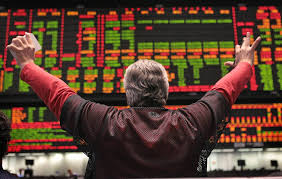Investors Braced For An Earnings Recession. It Doesn’t Look Like It’s Happening

Investors were ready for bad news.
Going into this earnings season, there was an expectation that corporate profits would take a hit in the first quarter of 2019, declining from the robust results seen in the same period last year. Some analysts had S&P 500 profits down as much as 4% year-over-year, citing the diminishing one-time effects of the Trump tax cuts and an expected slowdown in GDP growth.
So far, that hasn’t been the case. The U.S. economy grew at a 3.2% rate in the first quarter, exceeding expectations considerably, while the S&P 500 keeps setting all-time highs as it approaches the 3,000-point mark. With nearly half of the S&P 500 having reported earnings at the end of last week, financial data firm FactSet revised its previous expectation of a 3.9% earnings decline this quarter to a more modest 2.3% drop on April 26—noting that 77% of all companies to have reported earnings as of April 26 had beaten their estimates. Credit Suisse, meanwhile, reversed its forecast of a 2.5% decline to a year-on-year increase of between 2.5% to 3%.
“The 2018 tax cuts were a big part of why earnings were so high last year,” according to Randy Frederick, vice president of trading and derivatives at Charles Schwab’s Schwab Center for Financial Research. “There was a pretty broad consensus that we would see an earnings recession in Q1… We’re only halfway through [earnings season] and things can change, but I can’t imagine [earnings are] going to go negative.”
In fact, an “earnings recession,” as its known, would actually entail two consecutive quarters of declining earnings for S&P 500 companies. But even if that should pass over the first two quarters of 2019, some market participants are far from worried about what that could mean as far as the state of the market.
Brendan Connaughton, the founder and managing director of San Francisco-based wealth management firm Catalyst Private Wealth, says that it’s a question of whether a market-wide decline in earnings is “impactful enough” to indicate that investors should be concerned about a slowdown. He notes that Catalyst is expecting a 0.5% drop in S&P 500 profits in the second quarter—which, coupled with a first-quarter decline, would “technically qualify [as an earnings recession], but it won’t feel like it.”
Likewise, BMO Wealth Management released an analysis this week noting that six-month S&P 500 returns between 1995 and 2018 “are actually highest in [periods] that begin with year-on-year earnings declines, as long as those declines last only for one or two quarters.”
“If an earnings decline just lasts a couple of quarters, it doesn’t actually have a lasting impact on the markets,” Yung-Yu Ma, chief investment strategist at BMO Wealth Management, told Fortune. “The markets actually perform better, as long as that decline doesn’t last [three or more] quarters.” He noted that, like other market observers, BMO is “expecting to see [earnings] growth” in the second half of 2019.
So why all the fuss over the prospect of a dreaded “earnings recession”? TD Ameritrade trading strategist Shawn Cruz cites “a lot of uncertainty” over the ongoing effects of the Trump administration’s tax reform bill, which proved a major boost to first-quarter earnings last year. “There was a concern that because companies had such a big benefit last year, that was going to make it difficult to match those numbers this year,” according to Cruz.
As such, the prospect of a slowdown in profits has been a topic of conversation on Wall Street for some time now, which gave the market ample time to take note, digest and react. And when the markets didn’t react—instead continuing their steady climb upward—that was a sign that perhaps things wouldn’t be so bad after all.
Andrew Slimmon, a managing director at Morgan Stanley Investment Management, notes how he wrote about the risk of an earnings recession in a note at the start of the year; by March, he adds, “everyone knew about [the possibility of] this earnings recession.”
Yet the markets kept rising. “When everyone highlights a risk but the market doesn’t react to it,” Slimmon says, “then it’s probably not going to happen.”
At least not this quarter.





